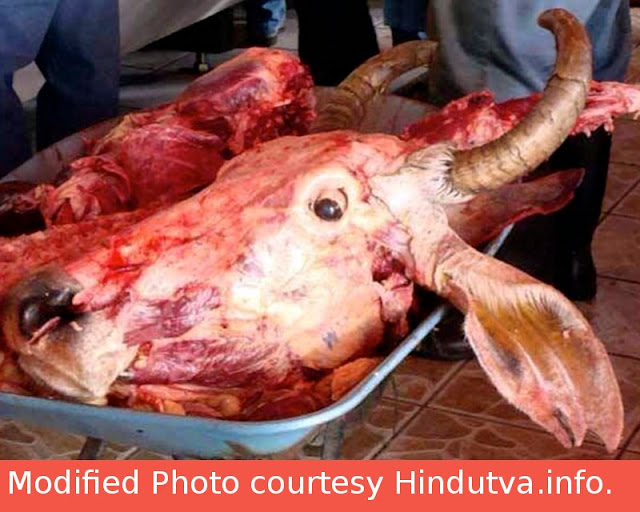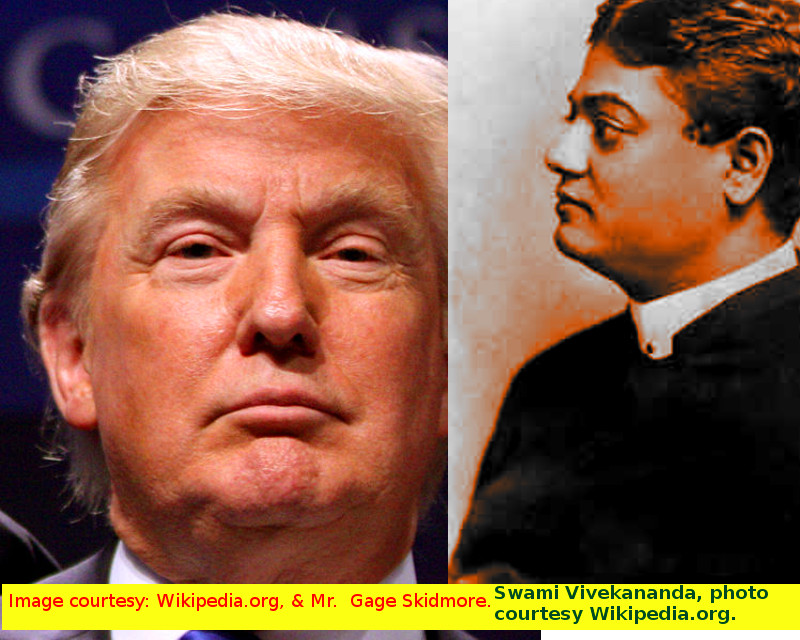#123 VIVEKANANDA AND THE TITLE OF "PARAMAHAMSA"
Paramahamsa literally means Supreme Swan (Parama=Supreme, hamsa=swan). In Hindu philosophy a soul is symbolised as a swan. A paramahamsa, therefore, is a soul which has attained a state of supreme bliss.
How to know whether a particular person's soul (if at all it exists) has attained/reached the supreme state of bliss? Nobody can check it. Anybody can claim that he has a soul, which has experienced the supreme bliss.
There is an impression among some Hindus that 'Paramahamsa' title is conferred by some person of competent authority.
We have to remember that Hinduism is not an organised religion and there are no competent authorities to award titles. Traditionally, some Monasteries used titles like 'Jagadguru (Teacher of the World)', 'Sankaracharya', and 'Paramahamsa Parivrajakacharya' etc. But even for these titles, the authority is doubtful. Somebody in the line of succession over centuries started using them and the custom glued to the institutions and their heads.
Swami Vivekananda wrote to his brother disciple Swami Akhandananda from Ghazipur in March 1890. This letter explains how Akhandananda can reach the place where Swamiji was staying at Ghazipur:
BLOGGER'S VIEW
This shows that Swamiji introduced himself as 'Paramahamsa' to the people around Pavahari Baba's Ashram at Ghazipur. At an age of just 27, he was claiming to be a Paramahamsa, conferring the title to himself, because people of Ghazipur did not know what was his life at Calcutta. Ochre-robes and hearing some spiritual words from Shri Ramakrishna were just sufficient for him to call himself Paramahamsa.
In 1892, he visited Belgaum. He stayed as a guest of one Shri G.S. Bhate for nine days. When Mr. Bhate enquired about his eating flesh, Swamiji claimed to be of Paramahamsa order. In the reminiscence of Mr. Bhate:
BLOGGER'S VIEW
So Vivekananda is not an ordinary monk! He is a Paramahamsa. Where is this Paramahamsa Order?
Swamiji wrote to Mrs. Hale from Annisquam, USA, on Aug. 20, 1894:
BLOGGER'S VIEW
Here, fairly enough Swamiji is conceding that he has not reached the goal. Though he promised to write to his brothers in India, (by implication: not to use the title), no such letter seems to have been written. The question is: What he could claim before neighbors in Ghazipur, before Brahmins at Belgaum, why he could not claim before American Women? This is what is called in Management science, "Contingency approach" i.e. depending on situations, the strategy will change.
PARAMAHAMSA TITLE IN RAMNAD FELICITATION
In 1897, Vivekananda returned to India via Colombo. At Ramnad, he was welcomed by the Raja of Ramnad. A grand felicitation took place, who used the following titles:
Vivekananda preached at length in reply to the felicitation. But he did not object to use of empty titles.
MORE ABOUT PARAMAHAMSA
Paramahamsa Yogananda, another preacher from India, claimed that he reeived his title 'Paramahamsa' title from his Guru Yukteswar.
How to know whether a particular person's soul (if at all it exists) has attained/reached the supreme state of bliss? Nobody can check it. Anybody can claim that he has a soul, which has experienced the supreme bliss.
There is an impression among some Hindus that 'Paramahamsa' title is conferred by some person of competent authority.
We have to remember that Hinduism is not an organised religion and there are no competent authorities to award titles. Traditionally, some Monasteries used titles like 'Jagadguru (Teacher of the World)', 'Sankaracharya', and 'Paramahamsa Parivrajakacharya' etc. But even for these titles, the authority is doubtful. Somebody in the line of succession over centuries started using them and the custom glued to the institutions and their heads.
Swami Vivekananda wrote to his brother disciple Swami Akhandananda from Ghazipur in March 1890. This letter explains how Akhandananda can reach the place where Swamiji was staying at Ghazipur:
"...you have only to go there and inquire about the Paramahamsa, and they will tell you of me ..."
BLOGGER'S VIEW
This shows that Swamiji introduced himself as 'Paramahamsa' to the people around Pavahari Baba's Ashram at Ghazipur. At an age of just 27, he was claiming to be a Paramahamsa, conferring the title to himself, because people of Ghazipur did not know what was his life at Calcutta. Ochre-robes and hearing some spiritual words from Shri Ramakrishna were just sufficient for him to call himself Paramahamsa.
In 1892, he visited Belgaum. He stayed as a guest of one Shri G.S. Bhate for nine days. When Mr. Bhate enquired about his eating flesh, Swamiji claimed to be of Paramahamsa order. In the reminiscence of Mr. Bhate:
"...As regards food, when he was asked whether he was a vegetarian or a meat-eater, he said that as a man belonging not the ordinary order of Sannyasins but to the order of the Paramahamsas, he had no option in the matter. The Paramahamsa, by the rules of that order, was bound to eat whatever was offered ..."
BLOGGER'S VIEW
So Vivekananda is not an ordinary monk! He is a Paramahamsa. Where is this Paramahamsa Order?
Swamiji wrote to Mrs. Hale from Annisquam, USA, on Aug. 20, 1894:
"...Paramahamsa is a title for a Sannyasi who has reached the goal, i.e. realized God. Neither am I blessed nor have I reached the goal; but they are courteous, that is all. I will soon write to my brothers in India. I am so lazy, and I cannot send over the newspaper nonsense day after day. ..."
BLOGGER'S VIEW
Here, fairly enough Swamiji is conceding that he has not reached the goal. Though he promised to write to his brothers in India, (by implication: not to use the title), no such letter seems to have been written. The question is: What he could claim before neighbors in Ghazipur, before Brahmins at Belgaum, why he could not claim before American Women? This is what is called in Management science, "Contingency approach" i.e. depending on situations, the strategy will change.
PARAMAHAMSA TITLE IN RAMNAD FELICITATION
In 1897, Vivekananda returned to India via Colombo. At Ramnad, he was welcomed by the Raja of Ramnad. A grand felicitation took place, who used the following titles:
"...His most holiness: Sri Paramahamsa, Yati-Raaja, Digvijaya-Kolaahala, Sarvamata-Sampratipanna, Parama-Yogeeswara, Srimat Bhagavaan Sree Ramakrishna Paramahamsa Karakamala Sanjaata, Raajaadhiraaja-Seevita, SREE VIVEKANANDA SWAMI, MAY IT PLEASE YOUR HOLINESS ..."
Vivekananda preached at length in reply to the felicitation. But he did not object to use of empty titles.
MORE ABOUT PARAMAHAMSA
Paramahamsa Yogananda, another preacher from India, claimed that he reeived his title 'Paramahamsa' title from his Guru Yukteswar.



Comments